Best laptops for engineering students | Engineering studies are a thrilling journey of innovation and creation, but they can also be demanding. Between mastering complex concepts, crunching numbers, and tackling intricate designs, engineering students need a reliable and powerful laptop to be their trusty companion. Worry not, future engineers, for this guide will navigate you through the vast tech landscape and help you find the perfect laptop to conquer every curve, hurdle, and late-night coding session.
Whether you’re a coding whiz, a simulation specialist, or a budding inventor, the ideal engineering laptop should be a powerhouse of processing muscle, paired with a vibrant display, a comfortable keyboard, and enough battery life to fuel your all-nighters. So, grab your metaphorical blueprints and let’s dive into the best laptops for engineering students.
Engineering Laptop Requirements
- Processor: Intel Core i5 (11th Gen or newer) or AMD Ryzen 5 (5000-series or newer). Prioritize clock speed and cores (4+).
- Memory: 16GB RAM (32GB recommended for heavy workloads).
- Storage: 500GB SSD (NVMe preferred for faster speeds).
- Operating System: Windows 10/11 (64-bit) or macOS (depending on software compatibility).
- Graphics card: Dedicated GPU is not always necessary, but it helps with graphics-intensive tasks like 3D modeling, simulations, and video editing. Aim for Nvidia GTX 1650 or AMD Radeon RX 5600M or higher.
The Best Laptops for Engineering Students
- Apple 2023 MacBook Pro Laptop M3 Pro chip ($2,249)
- Dell Precision 7770 Mobile Workstation ($3,498)
- HP 2023 Envy Laptop ($2,229)
- MSI Raider GE76 Gaming Laptop ($1,299)
- ASUS 2024 Creator Laptop Q540 ($1,649)
- Lenovo Legion Slim 5 Gaming ($1,353)
1. Apple 2023 MacBook Pro Laptop M3 Pro chip
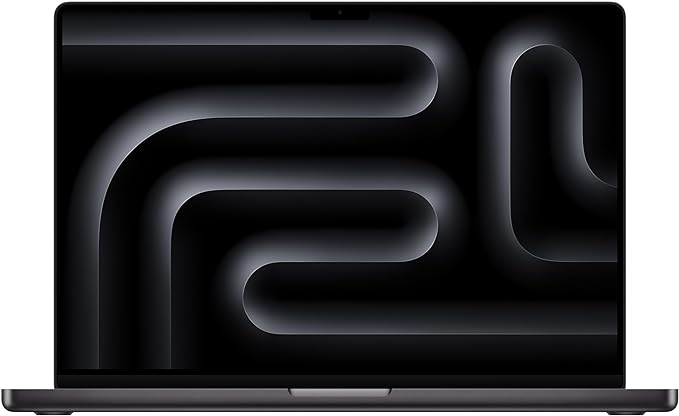
| Model Name | MacBook Pro |
| Screen Size | 16.2 Inches |
| Hard Disk Size | 512 GB |
| Ram Memory Installed Size | 18 GB |
| Operating System | Mac OS |
| Graphics Card Description | Integrated |
| Graphics Coprocessor | Apple Integrated Graphics |
The MacBook Pro with the M3 Pro or M3 Max chip is a powerful and feature-rich laptop that appears to be well-suited for engineering students. Let’s break down its features in the context of being an ideal device for engineering tasks:
Properties of MacBook Pro
- Performance Powerhouse: The M3 Pro and M3 Max chips offer impressive CPU and GPU capabilities, making this MacBook Pro suitable for demanding engineering workflows such as 3D rendering, coding, and handling large datasets. This is beneficial for engineering students who often engage in resource-intensive tasks.
- Battery Life: With up to 22 hours of battery life, the MacBook Pro ensures that engineering students can work on their projects and assignments throughout the day without worrying about running out of power during classes or study sessions.
- Pro Display: The 16.2-inch Liquid Retina XDR display with Extreme Dynamic Range and high brightness levels provides an excellent visual experience. This is advantageous for engineering students working with detailed designs, CAD models, and other visual content.
- Compatibility with Pro Apps: The MacBook Pro is fully compatible with a range of professional applications commonly used in engineering, including Adobe Creative Cloud, Apple Xcode, and MathWorks MATLAB. This ensures that students can seamlessly run the software needed for their coursework.
- Advanced Camera and Audio: The 1080p FaceTime HD camera, three-mic array, and six-speaker sound system with Spatial Audio enhance the quality of virtual meetings, presentations, and collaborative work, which is crucial for engineering students.
- Connectivity Options: The inclusion of a variety of ports, including MagSafe, Thunderbolt 4, HDMI, and an SDXC card slot, offers flexibility for connecting peripherals and external displays—an essential feature for engineering tasks that may require multiple devices or monitors.
- Magic Keyboard with Touch ID: The backlit Magic Keyboard with Touch ID provides a secure and convenient way for engineering students to access their laptops and authenticate for various applications, adding to overall productivity.
- Advanced Security and Longevity: The MacBook Pro emphasizes security with encryption, virus protection, and a powerful firewall—important considerations for safeguarding sensitive engineering projects. The promise of free software updates helps ensure the laptop remains current and functional for years.
- Integration with Apple Ecosystem: The seamless integration with other Apple devices allows engineering students to enhance their productivity by easily transferring data and performing tasks across different Apple platforms.
- Durability: The all-aluminum unibody enclosure adds durability to the MacBook Pro, ensuring that it can withstand the rigors of daily use, making it a reliable choice for the entire duration of an engineering student’s academic journey.
In summary, the MacBook Pro with the M3 Pro or M3 Max chip, with its combination of performance, display quality, connectivity options, and security features, makes it a strong contender as one of the best laptops for engineering students.
2. Precision 7770 Mobile Workstation (Best Dell laptop for engineering students)
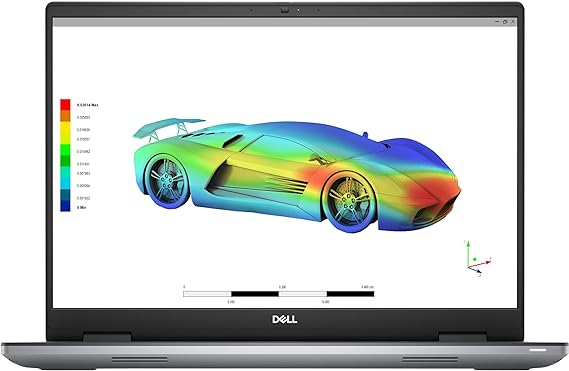
| Model Name | Precision 7770 |
| Screen Size | 17 Inches |
| Hard Disk Size | 512 GB |
| CPU Model | Core i7 |
| Ram Memory Installed Size | 64 GB |
| Operating System | Windows 11 Pro |
| Graphics Card Description | Dedicated |
| Graphics Coprocessor | NVIDIA RTX A4500 16GB GDDR6 (4DP) |
| CPU Speed | 4.8 GHz |
The Dell Precision 7770 is a powerful and well-equipped laptop that might suit engineering students. Here’s a breakdown of the features that make it a potential candidate for the title “Best laptops for engineering students”:
Properties of Precision 7770
- Performance: The Intel Core 12th Generation i7-12850HX processor with 16 cores and a maximum clock speed of 4.80GHz, combined with the NVIDIA RTX A4500 GPU with 16GB GDDR6, provides a robust computing and graphics performance. This configuration is well-suited for engineering applications and tasks that demand high computational power.
- Memory and Storage: The massive 64GB DDR5 RAM and a fast 512GB PCIe M.2 NVMe SSD offer ample memory and storage capacity. Engineering software often requires substantial resources, and having a large amount of RAM is beneficial for handling complex simulations and multitasking.
- Display: The 17.3-inch FHD display with a wide view angle, anti-glare coating, 500 nits brightness, and 99% DCIP3 color gamut provides a high-quality visual experience. This is important for tasks like CAD design, where color accuracy and detail are crucial.
- Connectivity: The inclusion of Intel Wi-Fi 6E and Bluetooth enhances wireless connectivity, which can be beneficial for accessing online resources, collaborating with peers, and connecting to other devices.
- Security Features: The laptop comes with a FHD IR camera with shutter, ExpressSign-In, and Intelligent Privacy features, providing an added layer of security. The SmartCard Reader is also a useful feature for securing sensitive data.
- Windows 11 Pro: The inclusion of Windows 11 Pro offers the latest operating system with features optimized for productivity and security.
- Warranty and Onsite Support: The 3 years onsite warranty adds a level of confidence, ensuring that the laptop is supported in case of any issues during its lifespan.
Overall, the Dell Precision 7770 combines powerful hardware, a high-quality display, and security features, making it a compelling choice for engineering students who require a laptop capable of handling demanding tasks and providing a reliable and secure computing experience.
3. HP Envy (Best HP laptop for engineering students)
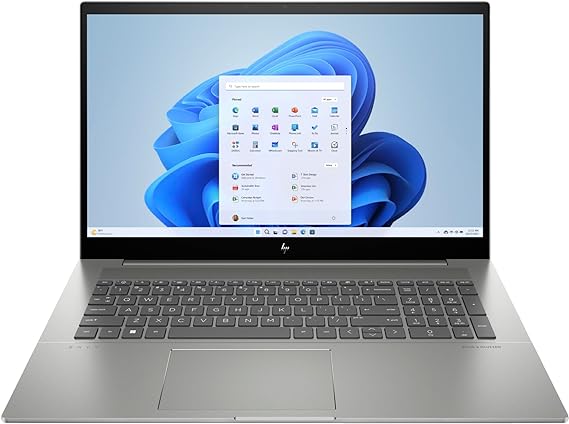
| Model Name | 17-CR100 |
| Screen Size | 17.3 Inches |
| Color | Natural Silver |
| Hard Disk Size | 4 TB |
| CPU Model | Core i7 Family |
| Ram Memory Installed Size | 64 GB |
| Operating System | Windows 11 Pro |
| Special Feature | HD Audio, Backlit Keyboard, Numeric Keypad |
| Graphics Card Description | NVIDIA GeForce RTX3050 4GB Dedicated |
The HP Envy laptop is a powerful and feature-rich device that can be a suitable choice for engineering students. Here are some key aspects of the laptop that align with the needs of engineering students:
Properties of Envy 17
- Powerful Performance: The laptop boasts the latest 10-core 13th Gen Intel Core i7-1355U processor with up to 5.0 GHz clock speed. This level of performance is beneficial for running demanding engineering applications, simulations, and multitasking.
- Ample Memory and Storage: With 64GB DDR4 SDRAM and a 4TB M.2 NVMe Solid State Drive, the laptop offers generous memory and storage capacity. This is advantageous for handling large datasets, complex CAD models, and other resource-intensive tasks that engineering students often encounter.
- Dedicated Graphics: The NVIDIA GeForce RTX3050 graphics with 4GB GDDR6 is a dedicated GPU, providing the graphics power needed for 3D modeling, rendering, and other graphic-intensive applications commonly used in engineering disciplines.
- Large and High-Quality Display: The 17.3″ diagonal FHD display with IPS technology and multitouch capability is beneficial for engineering tasks that require precision and detailed viewing. The 100% sRGB color gamut ensures accurate color representation, which can be crucial for design work.
- Connectivity Options: The laptop offers a range of connectivity options, including Wi-Fi 6E, Bluetooth 5.3, Thunderbolt 4 Type-C ports, USB Type-A ports, HDMI 2.1, and an SD card reader. This versatility allows for seamless integration with various peripherals and devices.
- Enhancements for Productivity: The inclusion of Windows 11 Pro, a backlit keyboard, and audio features by Bang & Olufsen, along with dual speakers and HP Audio Boost, contribute to an enhanced user experience and productivity.
- Portable Design: Despite its powerful specs, the laptop maintains a relatively slim and lightweight profile (5.5 lbs), making it suitable for students who need to carry their laptops between classes and workspaces.
Considering these features, the HP Envy laptop appears to be well-suited for engineering students who require a high-performance device capable of handling the computational demands of their coursework and projects.
4. MSI Raider GE76 (Best laptop for engineering students on a budget)
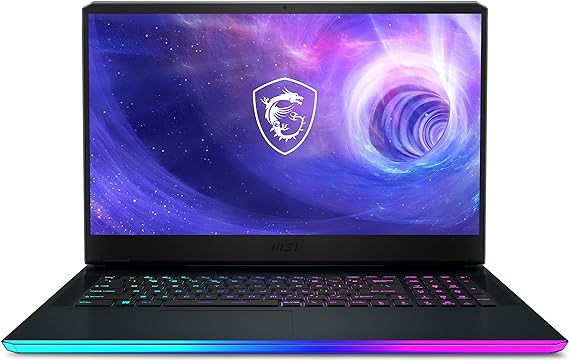
| Model Name | Raider GE76 12UE-871 |
| Screen Size | 17.3 Inches |
| Color | Black |
| Hard Disk Size | 1 TB |
| CPU Model | Core i9 |
| Ram Memory Installed Size | 16 GB |
| Operating System | Windows 11 Home |
| Special Feature | Numeric Keypad |
| Graphics Card Description | NVIDIA GeForce RTX 3060 Dedicated |
The MSI Raider GE76 Gaming Laptop offers several features that make it a good choice for engineering students:
Properties of Raider GE76
- Powerful Processor: The 1.8 GHz core_i9 processor provides high processing power, which is essential for running engineering software and performing complex calculations efficiently.
- Ample RAM: With 16 GB DDR5 RAM, the laptop can handle multitasking and memory-intensive engineering applications without slowing down.
- Large SSD Storage: The 1 TB SSD provides ample storage space for storing large engineering files, software programs, and multimedia projects, allowing students to access their work quickly.
- Dedicated Graphics Card: The NVIDIA GeForce RTX 3060 graphics card with 6 GB of dedicated RAM ensures smooth rendering and performance in CAD software, simulation tools, and graphics-intensive applications commonly used in engineering disciplines.
- High-Resolution Display: The 17.3-inch display with a resolution of 1920 x 1080 pixels offers a crisp and clear viewing experience, making it suitable for viewing detailed engineering diagrams, schematics, and design projects.
- Multiple USB Ports: The laptop features four USB 3.0 ports, allowing students to connect external devices such as printers, scanners, external storage drives, and peripherals easily.
- Bluetooth Connectivity: Bluetooth connectivity enables wireless connection to compatible devices such as wireless headphones, mice, and keyboards, enhancing convenience and reducing cable clutter.
Overall, the MSI Raider GE76 Gaming Laptop offers a powerful combination of performance, storage, graphics capabilities, and connectivity options, making it well-suited for the demanding requirements of engineering students.
5. ASUS 2024 Creator Laptop Q540
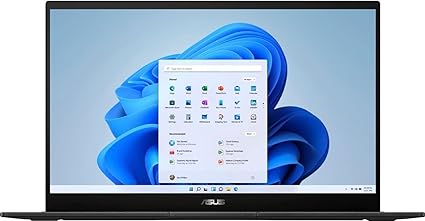
| Model Name | Creator Laptop Q |
| Screen Size | 15.6 Inches |
| Color | Black |
| Hard Disk Size | 2 TB |
| CPU Model | Intel Core i9 |
| Ram Memory Installed Size | 24 GB |
| Operating System | Windows 11 Pro |
| Graphics Card Description | NVIDIA GeForce RTX 3050 6GB Dedicated |
The ASUS Creator Laptop Q540 presents an excellent choice for engineering students due to several key features:
Properties of ASUS Creator
- Powerful Performance: The laptop is equipped with a 13th Generation Intel Core i9-13900H processor, featuring 14 cores and 20 threads. This high-performance CPU is capable of handling demanding engineering software and multitasking efficiently.
- Customization Potential: The ability to upgrade both hardware and software allows engineering students to adapt the laptop to their specific needs and future requirements as they progress through their studies.
- Ample Memory and Storage: With 24GB of DDR5 SDRAM clocked at 4800 MHz and a spacious 2TB PCI-E NVMe Solid State Drive, the laptop offers plenty of memory and storage space for storing large engineering projects, datasets, and software applications.
- High-Resolution Display: The brilliant 15.6″ OLED 3K display with a resolution of 2880 x 1620 and 100% DCI-P3 color gamut coverage provides engineers with crisp visuals and accurate color representation, crucial for tasks such as CAD design, 3D modeling, and data visualization.
- Dedicated Graphics Processing: The NVIDIA GeForce RTX 3050 with 6GB GDDR6 VRAM ensures smooth performance in graphic-intensive applications, including rendering, simulations, and virtual prototyping.
- Comprehensive Connectivity: The laptop offers a variety of connectivity options, including Wi-Fi 6E, Bluetooth 5.2, Thunderbolt 4, USB-C, USB 3.2, HDMI, LAN, and memory card slots, enabling seamless integration with external devices and peripherals commonly used in engineering tasks.
- Enhanced User Experience: Features such as a full-size backlit keyboard with a numeric keypad, fingerprint reader, Dolby Atmos speakers, and a 720p HD camera with privacy shutter contribute to a comfortable and productive user experience, ideal for long hours of study and collaboration.
- Portable and Durable Design: Despite its powerful hardware, the laptop maintains a relatively lightweight and slim profile, making it easy to carry between classes, labs, and study sessions. The inclusion of a 70Whr battery ensures extended productivity on the go.
In summary, the ASUS Creator Laptop Q540 offers a compelling combination of performance, versatility, and user-centric features tailored to the demanding requirements of engineering students, making it a top contender in the category of best laptops for engineering students.
6. Lenovo Legion Slim 5 Gaming
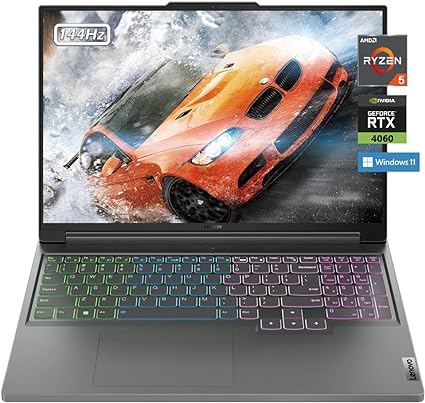
| Model Name | Legion Slim 5 |
| Screen Size | 16 Inches |
| Hard Disk Size | 1 TB |
| CPU Model | Ryzen 5 |
| Ram Memory Installed Size | 32 GB |
| Operating System | Windows 11 |
| Special Feature | Backlit Keyboard |
| Graphics Card Description | NVIDIA GeForce RTX 4060 |
The Lenovo Legion Slim 5 boasts several features that make it a fantastic choice for engineering students:
Properties of Legion Slim 5
- Powerful Processor and Graphics: The AMD Ryzen 5 7640HS processor, with its 6 cores and turbo boost up to 5.0GHz, provides ample processing power for running demanding engineering software. Coupled with the NVIDIA GeForce RTX 4060 graphics card with 8GB of VRAM, this laptop can handle graphically intensive tasks with ease, such as CAD software and simulations.
- Ample Memory and Storage: With 32GB of DDR5-4800 RAM, multitasking becomes smooth and efficient, allowing students to work on multiple projects simultaneously without experiencing performance slowdowns. Additionally, the 1TB SSD provides ample storage space for storing large engineering datasets, software installations, and project files.
- High-Resolution Display: The 16″ WUXGA IPS display with a resolution of 1920×1200 and a refresh rate of 144Hz offers crisp visuals and smooth motion, enhancing the user experience when working on detailed engineering designs or viewing complex simulations.
- Versatile Connectivity: The laptop offers a range of ports including HDMI 2.1 and DisplayPort 1.4 for connecting external monitors, ensuring flexibility in setting up multi-monitor workstations. Multiple USB-A and USB-C ports provide ample connectivity for peripherals and external storage devices, while Wi-Fi 6 ensures fast and reliable wireless internet connectivity.
- Portability: Despite its powerful hardware, the Legion Slim 5 is designed to be slim and lightweight, making it easy for engineering students to carry it between classes, labs, and study sessions.
Overall, the combination of powerful hardware, ample memory and storage, high-resolution display, versatile connectivity options, and portability makes the Lenovo Legion Slim 5 an excellent choice for engineering students who require a reliable and capable laptop for their academic and professional endeavors.
Conclusion – Best laptops for engineering students
Choosing the perfect laptop for an engineering student is a balancing act between power, portability, and budget. Ultimately, the ideal machine will depend on your specific needs and priorities. Whether you prioritize raw processing power for demanding software, a lightweight design for on-the-go productivity, or a versatile 2-in-1 form factor, consider all aspects to find the laptop that fuels your engineering journey. Remember, the best laptop is the one that empowers you to learn, create, and innovate, propelling you towards success in your chosen field. So, research, compare, and invest in a machine that seamlessly integrates with your engineering workflow, paving the way for a future filled with possibilities.
FAQs – Best laptops for engineering students
Engineering students juggle demanding coursework, complex projects, and late-night study sessions, all while navigating the ever-evolving tech landscape. Choosing the right laptop can make a world of difference, becoming a reliable companion for crunching numbers, rendering 3D models, and staying productive on the go. This FAQ dives into the key considerations, helping you navigate the specs and features to find the best laptop that fuels your engineering journey, from freshman year to graduation and beyond. So, grab your favorite beverage, open your brain trust, and let’s explore the world of laptops built for engineering success!
In this section, we will look for answers to the following frequently asked questions about laptops for engineers.
- What type of laptops do engineers use?
- How powerful of a laptop do I need for engineering?
- How much RAM should an engineering laptop have?
- Is 16GB RAM enough for engineering students?
- What laptop is best for an engineering student?
- Is i5 or i7 better for engineering?
1. What type of laptops do engineers use?
The type of laptop engineers use can vary greatly depending on their specific field and needs. However, there are some general trends:
Processing Power: Most engineers will need a laptop with a powerful processor, such as an Intel Core i5 or i7 or AMD Ryzen 5 or 7. This is because they will often be running demanding software, such as CAD programs, simulations, or video editing software.
RAM: Engineers also need plenty of RAM, typically at least 16GB. This is because they will often have multiple programs running at the same time, and they need the RAM to handle the multitasking.
Storage: Engineers often need a lot of storage space, especially if they are working with large files like 3D models or video footage. An SSD is a must for fast loading times and overall snappier performance.
Graphics: Some engineers, such as those who work in gaming or video editing, will need a dedicated graphics card. However, many engineers can get by with the integrated graphics that come with most processors.
Portability: Some engineers need a laptop that is light and portable so they can take it with them on the go. Others need a more powerful desktop replacement laptop that can handle demanding tasks.
2. How powerful of a laptop do I need for engineering?
The power of the laptop you need for engineering really depends on your specific field and the software you’ll be using. Here’s a general breakdown:
Minimum requirements:
- Processor: Intel Core i5 or AMD Ryzen 5 (or higher) – These processors can handle most basic engineering tasks like coding, 2D drafting, and running simulations.
- RAM: 8GB (16GB recommended) – RAM helps with multitasking and running demanding software. 8GB is the minimum, but 16GB will make things smoother, especially if you’re working with large datasets or complex models.
- Storage: 500GB SSD – A solid-state drive (SSD) is much faster than a traditional hard disk drive (HDD) and will significantly improve your laptop’s performance. 500GB should be enough for most basic needs, but you may need more if you’re working with large files.
Recommended for more demanding tasks:
- Processor: Intel Core i7 or AMD Ryzen 7 (or higher) – These processors will provide better performance for tasks like 3D modeling, finite element analysis, and video editing.
- RAM: 16GB (32GB recommended) – More RAM is always better for demanding tasks. 16GB is a good starting point, but 32GB will give you more headroom.
- Graphics card: Nvidia GeForce GTX 1650 or AMD Radeon RX 560 (or higher) – A dedicated graphics card is essential for running graphics-intensive software like 3D modeling and rendering.
Additional factors to consider:
- Battery life: If you’ll be using your laptop on the go, you’ll want a model with good battery life. Look for laptops that can last at least 8 hours on a single charge.
- Portability: If you’ll be carrying your laptop around a lot, you’ll want a model that’s lightweight and thin.
- Display: A high-resolution display will make it easier to see your work, especially if you’re working with detailed models or diagrams.
Here are some specific recommendations based on your field of engineering:
- Computer engineering: You’ll need a powerful laptop for tasks like coding, running simulations, and compiling software. Look for a laptop with a strong processor, plenty of RAM, and a dedicated graphics card.
- Electrical engineering: You’ll need a laptop that can handle circuit design software and simulations. A laptop with a good processor and at least 8GB of RAM is a good starting point.
- Mechanical engineering: You’ll need a laptop that can handle 3D modeling software and finite element analysis. Look for a laptop with a powerful processor, at least 16GB of RAM, and a dedicated graphics card.
- Civil engineering: You’ll need a laptop that can handle CAD software and GIS software. A laptop with a good processor, at least 8GB of RAM, and a decent graphics card is a good option.
Ultimately, the best laptop for you will depend on your individual needs and budget. Do some research on the software you’ll be using and talk to other students in your field to get their recommendations.
3. How much RAM should an engineering laptop have?
The ideal amount of RAM for an engineering laptop depends on several factors, including:
1. Your specific engineering discipline:
- Lighter workloads (basic coding, word processing, spreadsheets): 8GB of RAM is the minimum recommended, but 16GB is preferable for smoother multitasking.
- Moderate workloads (CAD software, light simulations): 16GB of RAM is a good starting point, with 32GB providing extra headroom for demanding tasks.
- Heavy workloads (3D modeling, complex simulations, video editing): 32GB of RAM is essential, and 64GB may be necessary for the most intensive tasks.
2. Software you plan to use: Check the recommended system requirements for your specific software. Some popular engineering applications have minimum RAM requirements, but exceeding those is often beneficial.
3. Multitasking habits: If you plan to run multiple programs simultaneously, more RAM will help avoid lag and crashes.
4. Futureproofing: If you plan to keep the laptop for several years, consider opting for more RAM than your immediate needs to accommodate potential software updates and increased workload complexity.
Here’s a general guideline:
- Minimum: 8GB
- Recommended: 16GB for most engineers
- Ideal: 32GB for demanding tasks or futureproofing
- Optional: 64GB for the most intensive workloads
Ultimately, the best amount of RAM is a balance between your budget, software needs, and future plans. If you’re unsure, it’s always better to err on the side of caution and choose a higher RAM capacity.
4. Is 16GB RAM enough for engineering students?
16GB RAM is generally good for engineering students, like a sweet spot. It handles most software, including CAD and simulations. Some fields like data science might need extra RAM later, but 16GB is a safe bet to start with!
5. What laptop is best for an engineering student?
It’s impossible to say definitively which laptop is “best” for an engineering student, as it depends heavily on several factors:
- Specific Engineering Discipline: Different engineering disciplines have different software and processing demands. Civil engineers might require strong CPU and RAM for AutoCAD and simulations, while electrical engineers might need a dedicated graphics card (GPU) for circuit design.
- Budget: Laptops for engineering can range from budget-friendly models to high-end beasts with hefty price tags. Determine your comfortable budget to narrow down options.
- Portability vs. Performance: Do you prioritize a lightweight, portable laptop for on-the-go studying, or a powerful desktop replacement for heavy-duty work at home?
- Operating System Preference: Do you prefer Windows, macOS, or Chrome OS? Each has its own advantages and disadvantages for engineering tasks.
6. Is i5 or i7 better for engineering?
Both i5 and i7 processors can be good for engineering, but the best choice for you will depend on your specific needs and budget. Here’s a breakdown to help you decide:
i5:
- Pros:
- Generally more affordable than i7 processors.
- Still powerful enough for most engineering tasks, including running CAD software, simulations, and basic 3D modeling.
- Good for everyday tasks like browsing, email, and video conferencing.
- Often paired with sufficient RAM and storage for a smooth workflow.
- Cons:
- May struggle with very demanding workloads or multitasking.
- May not be future-proof for more complex engineering software that may be released in the future.
i7:
- Pros:
- More powerful than i5 processors, offering faster performance for demanding workloads.
- Handles multitasking better, allowing you to run multiple programs simultaneously without lag.
- Better suited for future-proofing your computer, especially if you plan to use it for more advanced engineering tasks in the future.
- Often comes with higher clock speeds, more cores, and larger cache sizes for improved performance.
- Cons:
- Typically more expensive than i5 processors.
- May be overkill for some engineering students, especially those in their early years or those working with less demanding software.
- Not always necessary for basic engineering tasks.
Here are some additional factors to consider:
- Specific engineering discipline: Different engineering disciplines have different software requirements. For example, mechanical engineers might need more powerful processors for 3D modeling and simulations, while electrical engineers might need more RAM for circuit design.
- Budget: i7 processors are generally more expensive than i5 processors. Decide how much you are willing to spend on a computer before making your decision.
- Other computer components: Make sure your other computer components, such as RAM, storage, and graphics card, are also up to par for your engineering needs. An i7 processor won’t make a big difference if you have limited RAM or a slow hard drive.
Ultimately, the best processor for you will depend on your individual needs and budget. If you are a student working with basic engineering software, an i5 processor may be sufficient. However, if you are working with demanding software or plan to use your computer for professional work, an i7 processor may be a better investment.

